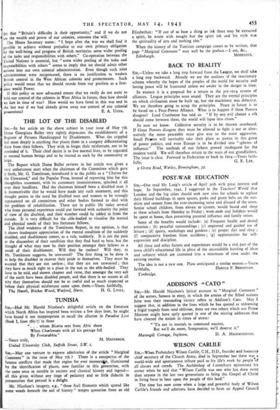POST-WAR EDUCATION
SIR,—One read Mr. Lang's article of April 3oth with great interest and hope. In September, 1941, I suggested in the Teachers' World that London and the big cities should seek new sites for schools to replace their blitzed buildings in open spaces, parks and green belts on the out- skirts and remote from the ever-increasing noise and discord of the town. Senior school children, from eleven to sixteen, would board and sleep at these schools from Monday to Friday ; week-ends and holidays would be spent at home, thus preserving parental influence and family union.
Some of the benefits would include: (a) Frequent health and dental attention ; (b) peaceful surroundings ; (c) improved and guided use of leisure ; (d) sports, workshops and gardens ; (e) proper diet and sleep ; (f) comparative freedom from accidents ; (g) opportunities for self- expression and discipline.
All these and other factors and experiences would be a real part of the town child's educational life in place of the unavoidable hustling of ideas and subjects which are crammed into a minimum of time under the existing routine.
The idea is not a new one. Plato anticipated a similar system.,-Yours


























 Previous page
Previous page